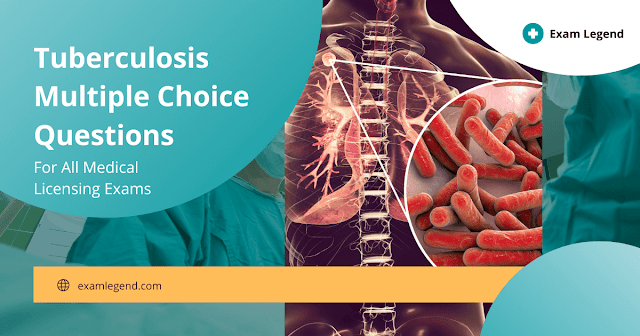Tuberculosis Multiple Choice Exam MCQ Questions With Answers
What is tuberculosis (TB)?
a. A type of bacteria
b. A type of virus
c. A type of fungus
Answer: a. A type of bacteria
What are the common symptoms of tuberculosis?
a. Cough, fever, and weight loss
b. Headache, nausea, and muscle aches
c. Rash, sore throat, and fatigue
Answer: a. Cough, fever, and weight loss
How is tuberculosis typically spread?
a. Through the air when an infected person talks, coughs, or sneezes
b. By drinking contaminated water
c. Through physical contact with an infected person
Answer: a. Through the air when an infected person talks, coughs, or sneezes
Which groups of people are most at risk of contracting tuberculosis?
a. People with weakened immune systems
b. Children
c. Older adults
Answer: a. People with weakened immune systems
What is the standard treatment for tuberculosis?
a. Antibiotic medication
b. Vaccination
c. Surgery
Answer: a. Antibiotic medication
You are a nurse working in a clinic and a patient comes in with a persistent cough and fever. What should you do?
a. Prescribe over-the-counter cough medicine
b. Refer the patient to a specialist for further evaluation
c. Tell the patient to rest and drink plenty of fluids
Answer: b. Refer the patient to a specialist for further evaluation
A friend of yours has been diagnosed with tuberculosis. What should you do to protect yourself?
a. Avoid close contact with your friend
b. Wear a mask when around your friend
c. Take antibiotics as a preventive measure
Answer: a. Avoid close contact with your friend
A family member has been diagnosed with tuberculosis. What measures should be taken to prevent the spread of the disease to others in the household?
a. Keep the infected person isolated in a separate room with good ventilation
b. Encourage the infected person to spend time with other family members
c. Allow the infected person to share personal items with others in the household
Answer: a. Keep the infected person isolated in a separate room with good ventilation
You work in a crowded office and one of your colleagues has been diagnosed with tuberculosis. What should you do?
a. Notify your boss and the human resources department
b. Keep working as usual and not worry about it
c. Ask to work from home for a few weeks
Answer: a. Notify your boss and the human resources department
You are a school teacher and one of your students has been diagnosed with tuberculosis. What should you do to protect the other students and staff?
a. Keep the infected student at home until they are no longer contagious
b. Allow the infected student to continue attending school
c. Provide masks to all students and staff
Answer: a. Keep the infected student at home until they are no longer contagious
A homeless person who frequently visits your local park has been diagnosed with tuberculosis. What steps should be taken to protect the community?
a. Notify the local health department and park officials
b. Do nothing, as the risk of transmission is low
c. Post signs in the park warning people to avoid contact with the homeless person
Answer: a. Notify the local health department and park officials
You have been diagnosed with tuberculosis. What should you do to ensure a successful treatment outcome?
a. Take all medications as prescribed, even if you feel better
b. Stop taking medications as soon as you feel better
c. Avoid close contact with others, including family members
Answer: a. Take all medications as prescribed, even if you feel better

Comments
Post a Comment